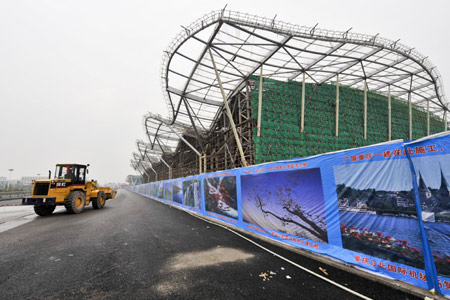Economy
Experts concerned over huge loans to local govts
By Wang Xiaotian (China Daily)
Updated: 2010-05-13 09:43
 |
Large Medium Small |
The Jiangbei International Airport construction site in Chongqing. Government investment and financing companies have been set up across the country to attract capital used in infrastructure and the construction of other public facilities. [Agencies]

Tightening measures may make it hard for firms to repay their debts
BEIJING - About 40 percent of new loans in the first quarter went to local government bodies, said an economist with the State Council's Development Research Center (DRC), with analysts warning that a potential crisis is looming.
Wei Jianing, deputy head of macroeconomic research department at the DRC, said the scale and debts of these local government-owned bodies - mainly financing companies using land and fiscal revenue as collateral - has been swelling rapidly, and may pose great risks to the economy.
"In the past, a government usually had two to four financing arms under its jurisdiction, but the number grew to 10 in 2009 under the country's proactive fiscal policy and loose monetary policy needs," he said, adding that the various levels of government investment and financing companies totaled more than 3,800, 70 percent of which are at district or county level.
The debts of these arms have surged to 6 trillion yuan in 2009 from 1 trillion yuan in early 2008, said Wei. In 2009, new loans to those financial arms reached about 3.8 trillion yuan, 40 percent of the 9.59 trillion in new credit from China's banks, he said.
Jia Kang, director of the Institute of Research at the Ministry of Finance, also said this month that he is not sure about the exact amount of local government debts, but said some researchers estimate they could amount to more than 8 trillion or even 11 trillion yuan.
Analysts said the central government's recent tightening of the housing market would greatly affect local fiscal revenue and make it very difficult for the governments to pay their debts.
According to the Ministry of Finance, in 2009 the nation pocketed 1.42 trillion yuan in land transfer revenue, about 3 percent of gross domestic product during that period.
Even when interest payments are not taken into account, it would take local governments four to five years to repay the 6 trillion yuan in loans.
"Revenue generated by selling land accounted for 45 percent of total local fiscal revenue last year. If the real estate market slumps and developers become hesitant about buying land, a crisis would erupt in local finances," said Tao Dong, chief analyst with UBS Securities in Asia.
| ||||
But some are more optimistic about the impact of the debts. "I don't believe the debts could pose much threat," said Jia, adding the biggest problem in local financing lies in the severe irregularities of borrowing.
He said the irregularities were reflected in the huge mismatch between the borrowed amount and the ability to repay in some regions. "But if we fight the fire only when the problems are already very evident, the social impact would be much greater."
In addition, the financing firms' executives, mainly government officials, often lack the necessary experience in management and risk prevention, added Wei.















